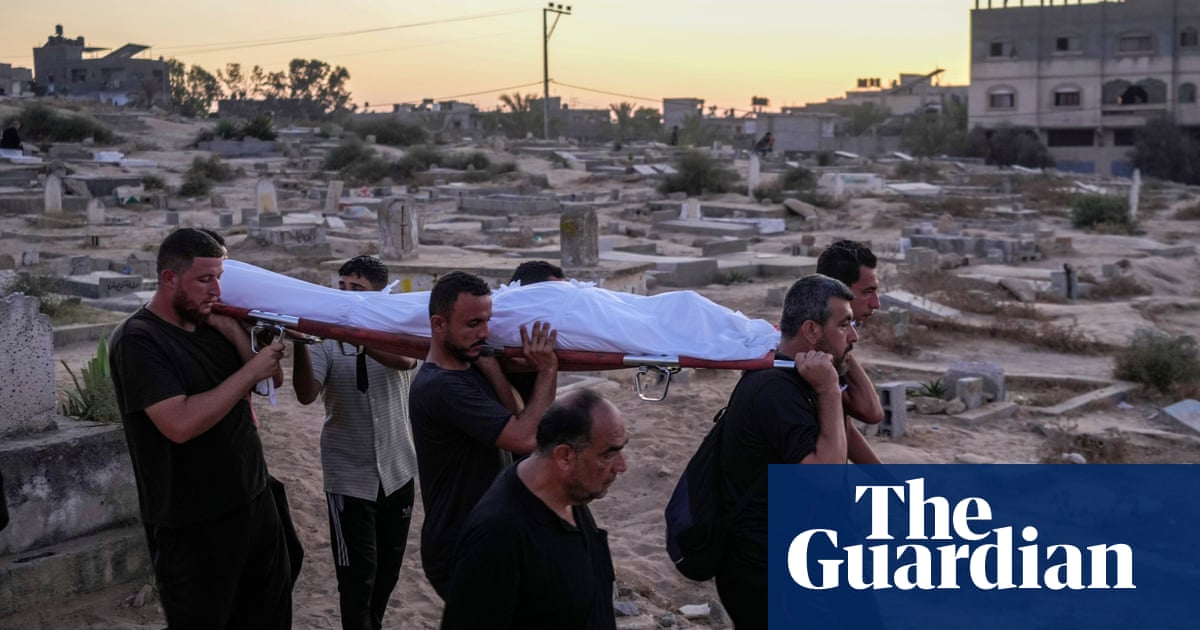A new round of negotiations aimed at brokering a ceasefire in the war in Gaza and preventing the fighting from escalating into a region-wide conflict has begun, as the death toll in the Palestinian territory reached a grim milestone of 40,000 people, according to local health authorities.
Mediators from the US, Qatar and Egypt met an Israeli delegation in the Qatari capital of Doha on Thursday afternoon, with talks expected to continue into the next day. Hamas, the Palestinian militant group, is not directly participating in the talks, meaning expectations of a breakthrough are low.
While Hamas and Israel agreed in principle last month to implement a three-phase plan publicly proposed by Joe Biden in May, both sides have since requested “amendments” and “clarifications”, leaving talks at an impasse. Gaps include the continuing presence of Israeli troops on the Gaza-Egypt border, the sequencing of a hostage release, and the return of civilians from southern to northern Gaza.
The renewed push for talks is seen as more vital than ever after the 31 July back-to-back assassinations of a top Hezbollah commander and Ismail Haniyeh, Hamas’s political chief. The killings in Beirut and Tehran, which the Lebanese group and Iran have blamed on Israel, threaten to transform the war in Gaza into a region-wide conflict.
It is hoped that a ceasefire in Gaza would lower the temperature in the Middle East and dissuade Iran and Hezbollah from retaliatory action. In an interview with CNN on Thursday, the White House’s national security spokesperson, John Kirby, said talks had begun with a “promising start”, but an immediate agreement is unlikely given the large gaps that remain between the two sides.
He added that the US assessed that Tehran is still determined to respond to Haniyeh’s killing with an attack on Israel. Over the past two weeks, the US has deployed warships, submarines and warplanes to the region to defend Israel from potential attacks from Iran and its network of allied militias in Iraq, Syria, Lebanon and Yemen, all of whom have already been drawn into the Gaza war.
Israel’s prime minister, Benjamin Netanyahu, has been accused of sabotaging the talks for political gain, but reportedly expanded the negotiating team’s mandate before it flew to Doha on Thursday morning.
In a statement on the eve of the talks, Hamas reaffirmed its demands, including that negotiations should focus on implementing the Biden plan rather than allowing Israel to “stall for time”.
The UK foreign secretary, David Lammy, who is reportedly planning an imminent trip to Israel, said in a statement: “We are at a crucial moment for global stability. The coming hours and days could define the future of the Middle East … A ceasefire would not only protect civilians in Gaza, but also pave the way for wider de-escalation and bring much-needed stability.
“It is in the interests of both Israelis and Palestinians for a deal to be agreed, urgently. I urge all parties to engage in the negotiations in good faith and show the flexibility needed to reach an agreement.”
As talks got under way in Doha, the Israeli army continued its latest ground operation in Gaza’s southern city of Khan Younis, with local people reporting artillery and aerial attacks, as well as bombings in Rafah. Israeli airstrikes killed 40 people in the strip in the last 24 hours, the health ministry in the Hamas-run territory said, pushing the death toll to 40,005 in 10 months of fighting.
The local authorities do not differentiate between civilian and militant casualties, but 70% are believed to be women and children.
The figure represents almost 2% of Gaza’s 2.3 million population, making the Gaza war one of the deadliest of the 21st century to date and by far the bloodiest in the decades-old Israeli-Palestinian conflict.
About 10,000 more people are believed to still be under the rubble, and those who have died from illness, starvation and other hardships caused by the war are not counted in official tolls.
Israel disputes the Gaza toll, but in multiple wars in the blockaded territory over the 17 years since Hamas took over, the UN has found that the local health authority figures are accurate.
Tarneem Hammad, the central Gaza-based advocacy officer for the UK charity Medical Aid for Palestinians, said: “Forty thousand lives lost in Gaza – a devastating reminder that behind each number is a story, a family, a future stolen. Let the magnitude not numb us, but rather ignite our resolve to seek justice and peace, and to demand a ceasefire. No more lives should be lost.”
Abu Nidal Eweini, a resident of the central town of Deir al-Balah, told the AP: “Oh Lord, we hope they reach an agreement and the war ends, because the population has been annihilated completely. People have no breath left in them any more. People are tired.”
Also on Thursday, during an address to the Turkish parliament in Ankara, the head of the West Bank-based Palestinian Authority, Mahmoud Abbas, vowed to visit the Gaza Strip.
Abbas’s secular Fatah party was exiled from Gaza after a brief civil war with Hamas in 2007, after which the Islamist group took control of the coastal territory. Elected to a five-year term in 2005, the deeply unpopular leader has repeatedly refused to hold elections since.
It was not immediately clear how Abbas, 88, would fulfil his pledge, as Israel controls all of Gaza’s border crossings.
Hamas triggered the war in Gaza with its 7 October attack on Israel in which about 1,200 people were killed and another 250 taken hostage. On Thursday, family and friends of the remaining estimated 115 Israelis still in captivity in Gaza protested in favour of a deal outside the Tel Aviv headquarters of Netanyahu’s Likud party.
